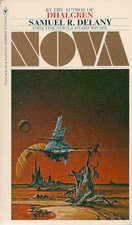Samuel R. Delany is an author who hasn't gotten the recognition he deserves, and of all his books, his space opera proto-cyberpunk novel of rival merchants battling for control of the commercial future of humanity is the one that gets the least recognition. Featuring a well-drawn protagonist in Lorq von Ray, a villainous antagonist in Prince Red, and his bizarrely weird sister Ruby Red, as well as the Mouse, Katin, the two-thirds of a set of triplets and others the novel examines cultural decay, worker alienation, the corruption of power, and of course, its main story: the idea that one can find the wealth of the universe in a dying star. The novel is at once space opera with a sweeping story about forces battling for control of the very galaxy, and has a gritty cyberpunkish feel. Despite the fact that this book is stunning in its brilliance, and has been described by some as the perfect science fiction novel, it is not particularly well known, and received only an indifferent response when it was first published. Nova (read review), like many of Delany's other excellent books, even went out of print for a while.








One thing about this particular question that made it a little difficult is that so many of Delany's novels are underrated. With the exception of Dhalgren, which almost every devoted science fiction fan knows about, and believes is a good book (although very few have actually read it), most of Delany's books are poorly known or unknown. As noted before, several of his books went out of print, despite the fact that he is clearly a huge influence on many of the science fiction authors that came after him, including most of the authors who wrote in the subgenre of cyberpunk.
Delany's career can be divided into two broad sections. In the first, in which he wrote books like Babel-17 and The Einstein Intersection, he was a fairly conventional science fiction author, although one who was very skilled and imaginative. At the age of twenty-five, he went on a five year hiatus in which he wrote almost nothing, and then he exploded with a barrage of output that was highlighted by his masterwork Dhalgren, and featured books with similarly overtly sexual themes like Triton and Stars in My Pocket Like Grains of Sand. Despite the fact that his early novels won back to back Nebula Awards and nominated for Hugo Awards, and his later novels are all breath-takingly brilliant, for some reason his work has faded into semi-obscurity. Nova, which was the last book produced during the first period of Delany's writing career before his five years of no writing. And though it was not given accolades like Babel-17 or The Einstein Intersection, it is Delany at the height of his powers, exploring so many varied topics in so many imaginative ways, that the fact that every person with even a slight interest in science fiction hasn't read this book is a crime.
Go to Day 2: Who Is Your Favorite Character?
Go to Day 4: What Is Your Guilty Pleasure Book?
30 Days of Genre Home

Oh, you are so right! My son and I were just discussing this last week. Amazing!
ReplyDelete